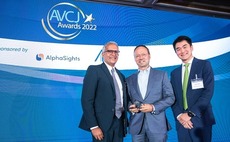
AVCJ at 25: Michael Chae of The Blackstone Group
Michael Chae, head of international private equity at The Blackstone Group, arrived in Asia after the global financial crisis and as the pre-IPO fever was about to turn. Changing times require changing strategies
"When I arrived here, the unbridled optimism in the markets was probably peaking. Since then there has not only been a pull back in the public equity market but also, more tangibly, a significant pull back in the mood," says Michael Chae, senior managing director and head of international private equity at The Blackstone Group. "It has been fascinating to observe."
Already a senior partner with Blackstone in New York, Chae relocated to Hong Kong in 2010. His broad remit was continue building the Blackstone team, combining local hires with talent developed in the New York and London offices who bring a connection to the firm's global ethos.
At the same time, Chae is very much a post-global financial crisis appointment. The more sober investment environment has altered the nature of deal flow that confronted global buyout firm executives who arrived in either of the first two waves: the late 1990s, when turnaround opportunities thrown up by the Asian financial crisis were all the rage; and the mid-2000s, which saw the emergence of China as a fully fledged private equity location.
"Pre-2007 you had several eventually quite successful deals that involved restructuring Chinese state-owned enterprises because the market was short on liquidity and foreign capital was scarcer. These deals greatly colored impressions of the market, but in fact they were of a certain historical moment in time," Chae observes. "After the crisis, in 2009 and 2010, the tenor of the market was more about pre-IPO, growth-oriented investments but in the last 18 months it has slowed considerably. Combined with the tightening in monetary stimulus and general slowdown in growth, it makes for an increasingly more interesting investment environment."
Blackstone's method of addressing the Asian opportunity thus far differs markedly from that of its peers. The firm had a presence in Japan in the late 1980s and early 1990s but the business was exclusively advisory. A team was also sent to Hong Kong in the mid-1990s, focusing on advisory and private equity work. "From 1985-2005 we had a terrific brand and franchise in the region but weren't fully resourcing it from an investment standpoint," Chae says.
Since then, the firm has made more than 20 private equity investments in the region totaling over $2.5 billion. It has a similar amount under management in real estate. Contrary to what one might expect, Blackstone's first office in the region opened in Mumbai in 2005, with Hong Kong, Beijing and Shanghai following two years later.
There was no conscious sequencing. India and China were always going to be key components to the business and it just so happened that the individual Blackstone wanted to lead its India efforts, Akhil Gupta, formerly of Reliance Industries, was available in 2005. Antony Leung, previously financial secretary of Hong Kong, joined in 2007 as senior managing director and chairman of China.
A matter of months after the rollout in China, the firm announced what remains one of its most significant investments in the country - the $600 million acquisition of a 20% stake in chemicals manufacturer China National Bluestar Group, a subsidiary of state-owned China National Chemical Corporation. At the time it was the largest private equity investment in China outside of financial services.
Blackstone has generated considerable deal flow in India, with logistics, IT outsourcing and manufacturing all featuring prominently. However, the largest commitments have come in the power and infrastructure sector, an area in which India has obvious needs. In the past two years, Blackstone has invested $300 million investment in Moser Baer Projects Private, $60 million in Monnet Power and a reported $111 million in Visa Power.
"Given the size of our capital base and the capital requirements for those projects, and our view of the infrastructure development opportunity in India, it makes a lot of sense," Chae says. He adds that these investments were a good fit for Blackstone's global power and energy practice. Earlier this year, the firm announced a final close of $2.5 billion on its first energy-focused global fund, which invests alongside the $16 billion Blackstone Capital Partners VI.
Differentiated approach
There are two vehicles specific to Asia: Blackstone assumed responsibility for $2 billion worth of property assets in 2010 when it replaced Bank of America Merrill Lynch as the GP for the Merrill Lynch Asian Real Estate Opportunity Fund; the firm announced its debut renminbi-denominated fund in 2009 with a target of RMB5 billion ($781 million).
However, Blackstone has no plans to launch a dedicated China or Asia US dollar-denominated fund. It raised the $22 billion Blackstone Capital Partners V - still the largest private equity vehicle ever seen - in 2005-2006, around the time its global counterparts were introducing Asian funds.
"We all made choices, and the global fund was raised with a view to serving as a platform for investing around the world," says Chae. "LPs liked this approach and they provided that size fund because they knew we would bring all our resources to bear investing in different regions. It's possible in the future we will look at other options, but for now we are happy with the global approach."
In the past year, efforts have been made to strengthen the China team, with Yi Luo joining from The Carlyle Group, Ed Huang from Morgan Stanley Private Equity Asia and MengGao from Oaktree Capital. Chae is also keen to expand the Blackstone footprint in Southeast Asia and is in the process of creating a regional hub in Singapore that will house teams focusing on PE real estate and other strategies.
"There are a number of different markets and it's hard to generalize, but the macros are really quite attractive long term," says Chae. "It is relatively early in the game in terms of the development of scale private equity but it's quite intriguing and we see attractive, sizeable opportunities coming over time."
There is also likely to be deeper penetration on the fundraising side. Of the $190 billion Blackstone has under management across its private equity, real estate, hedge funds, credit and advisory businesses, it is estimated that more than $20 billion comes from investors located in Asia. Most of these LPs - typically sovereign wealth funds, pension plans, financial institutions and high net worth individuals - are still at an early stage in the development of their programs and have substantial growth ahead of them in terms of assets under management and allocations to alternatives.
"If you are talking to the largest institutional pools of capital, it's critical for them to have a consolidated set of relationships with some of the biggest managers, particularly those who bring exposure to different asset classes," says Chae. "That's a great opportunity for us."
Latest News
Asian GPs slow implementation of ESG policies - survey
Asia-based private equity firms are assigning more dedicated resources to environment, social, and governance (ESG) programmes, but policy changes have slowed in the past 12 months, in part due to concerns raised internally and by LPs, according to a...
Singapore fintech start-up LXA gets $10m seed round
New Enterprise Associates (NEA) has led a USD 10m seed round for Singapore’s LXA, a financial technology start-up launched by a former Asia senior executive at The Blackstone Group.
India's InCred announces $60m round, claims unicorn status
Indian non-bank lender InCred Financial Services said it has received INR 5bn (USD 60m) at a valuation of at least USD 1bn from unnamed investors including “a global private equity fund.”
Insight leads $50m round for Australia's Roller
Insight Partners has led a USD 50m round for Australia’s Roller, a venue management software provider specializing in family fun parks.








